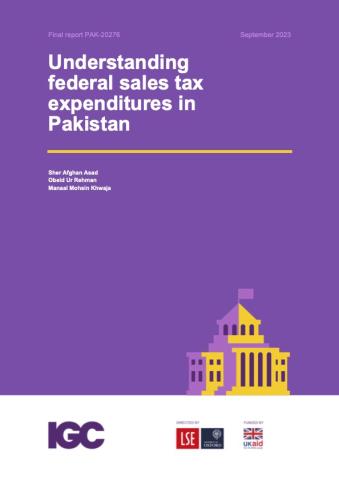Understanding federal sales tax expenditures in Pakistan
-
Asad et al final report September 2022_0.pdf
PDF document • 1.42 MB
Tax policy is a fundamental driver of economic development in any nation. Governments worldwide utilise tax policies to shape economic activities. These policies determine how taxes are levied, in what quantities, and to whom they apply. Generally, tax policies establish a standard tax code applicable to all economic activities, along with exceptions known as 'tax expenditures.' These exceptions include preferential tax rates, exemptions, deductions, allowances, rebates, deferrals, and credits, and they are employed to provide different tax treatment to various economic activities. This report, by documenting the history of statutory changes in sales tax expenditures, provides a thorough analysis of federal sales tax expenditures in Pakistan. It explores the historical trends in the statutory changes, offering insights that can contribute to discussions about their rationalisation.
Studying tax expenditures in Pakistan holds paramount significance due to its multifaceted implications. Firstly, tax expenditures substantially influence the nation's fiscal health and economic landscape. Tax expenditures can alter investment decisions, distort market behaviours, and impact resource allocation by providing special tax benefits to certain sectors or activities. This, in turn, affects overall economic growth, productivity, and employment patterns. Secondly, as Pakistan grapples with fiscal challenges and the need for sustainable revenue sources, comprehending the extent and impact of tax expenditures becomes crucial. These expenditures can substantially erode government revenues, leading to budgetary imbalances and hindering the country's ability to meet essential public needs.
Additionally, studying tax expenditures facilitates informed policy-making, enabling the government to refine and optimise its tax regime. By assessing the effectiveness of these expenditures in achieving their intended goals, policymakers can tailor tax policies to better align with economic objectives and equitable resource distribution. A comprehensive understanding of tax expenditures ultimately empowers Pakistan to enhance revenue efficiency, promote economic stability, and make informed decisions for sustainable development.
One of the reasons for the limited literature is the lack of well-organised data on tax expenditures. This project addresses this bottleneck by compiling the history of statutory exemptions and reductions in Pakistan for sales taxes. In Pakistan, sales tax on goods and services is the biggest beneficiary of tax expenditures, forming the central focus of this project. We are compiling the history of legal changes regarding tax expenditures in the sales tax acts via Finance Acts, SROs, and Tax Ordinances since 1990 at a granular level of item or category. The unlocking of this data source will enable the exploration of various vital questions related to sales tax expenditures in Pakistan.
In a recent report on tax expenditures in Pakistan, the Federal Board of Revenue (FBR) assessed federal tax expenditures at PKR 1,482.3 billion, equating to 31.2 percent of federal tax revenues during the fiscal year 2020-21 (Federal Board of Revenue, 2022). These expenditures were distributed across various categories: sales taxes accounted for 49.9 percent, income taxes constituted 27.0 percent, and customs duties represented 23.1 percent. It's essential to note that these calculations primarily consider the direct consequences of tax modifications, assuming that economic activities and taxpayer reporting behaviours remain unaffected by shifts in tax policy. However, including behavioural effects—such as changes in economic activities and differences in taxpayer reporting—can potentially alter the scope of these estimates significantly. Nonetheless, these evaluations underscore the considerable impact of tax expenditures on Pakistan's tax revenue landscape. Given the dominant role of sales tax expenditures, this report focuses on sales tax, with income and excise taxes reserved for future exploration.


